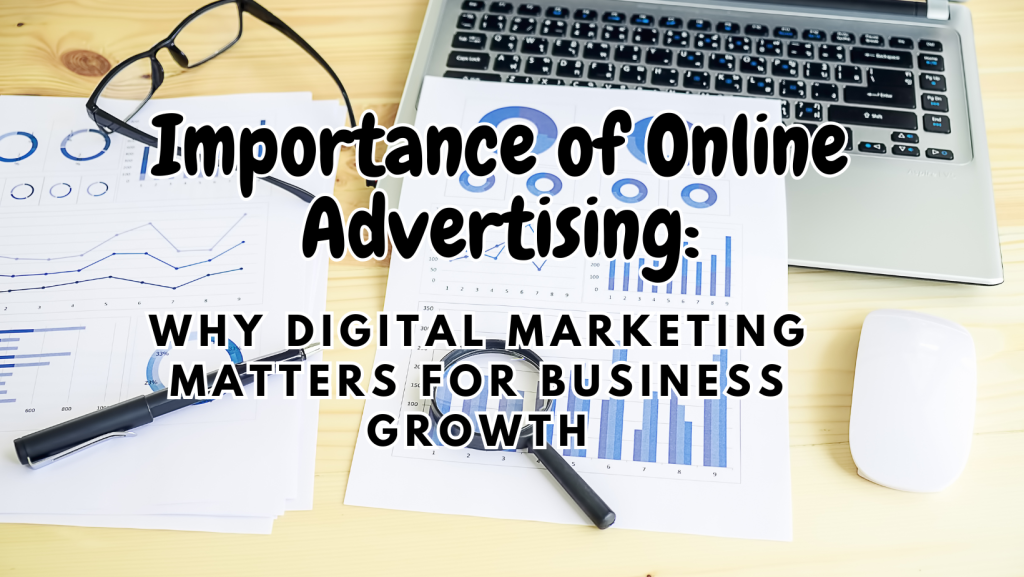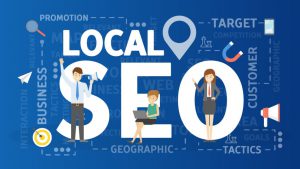In today’s digital world, businesses must harness the power of online advertising to reach their target audience effectively. Online advertising, also referred to as digital marketing, plays a crucial role in the success of businesses of all sizes by allowing them to engage with potential customers through various online platforms. From social media and search engines to video streaming services, online advertising offers a versatile and data-driven approach to marketing. This blog will delve into the importance of online advertising and how it has transformed the marketing landscape, helping businesses grow in an increasingly competitive environment.
Wider Reach and Global Audience
One of the key advantages of online advertising is its ability to reach a vast, global audience. Traditional advertising, such as print media or television, is often limited by geography and circulation. In contrast, online advertising breaks down these barriers, making it possible for businesses to connect with people from around the world. Whether you’re targeting local customers or a global audience, online platforms such as Google, Facebook, and Instagram allow businesses to fine-tune their advertising efforts to specific regions, demographics, and interests.
For example, a local bakery can use online advertising to attract customers within its city, while an e-commerce store can target customers globally. This wider reach ensures that businesses can expand their presence and reach new markets without the constraints of traditional media.
Cost-Effective Marketing
Compared to traditional advertising channels, online advertising is often more cost-effective, making it an attractive option for small and medium-sized businesses. Traditional media, like TV or radio ads, can be prohibitively expensive, with limited opportunities for targeting. Online advertising platforms, on the other hand, offer flexible pricing models, such as pay-per-click (PPC) or cost-per-impression (CPM), allowing businesses to control their budgets effectively.
With online advertising, businesses can set a daily or monthly budget, only paying when someone interacts with their ad (PPC) or when their ad is shown to users (CPM). This makes online advertising accessible to businesses with different budgets, giving them the ability to scale up their campaigns as their business grows.
Targeted and Personalized Campaigns
One of the most significant benefits of online advertising is the ability to create highly targeted and personalized campaigns. Unlike traditional advertising, which often casts a wide net in the hope of reaching the right audience, online advertising allows businesses to tailor their ads to specific user groups based on demographics, behavior, interests, and more.
Platforms like Facebook Ads, Google Ads, and LinkedIn Ads provide businesses with tools to define their audience with great precision. Whether you’re targeting a specific age group, gender, profession, or interest, online advertising ensures that your message reaches the people who are most likely to engage with your business.
Additionally, online advertising enables personalization, which is key to capturing the attention of modern consumers. With the help of data-driven insights, businesses can create personalized ads that resonate with users based on their previous interactions with the brand. This level of targeting and personalization helps improve conversion rates and ensures that advertising dollars are spent efficiently.
Measurable and Data-Driven Results
Online advertising offers a level of transparency and measurability that traditional advertising channels cannot match. Every aspect of an online ad campaign can be tracked and analyzed, providing businesses with valuable data on how their ads are performing. Metrics such as impressions, clicks, conversions, and return on investment (ROI) are readily available, allowing businesses to assess the success of their campaigns in real-time.
With tools like Google Analytics, businesses can gain insights into user behavior, track which ads are driving traffic, and identify which campaigns are delivering the best results. This data-driven approach to advertising enables businesses to make informed decisions, adjust their strategies, and optimize their campaigns for maximum effectiveness.
For example, if a company notices that one particular ad is generating more conversions than others, it can allocate more resources to that ad or use the insights to refine its overall strategy. This level of adaptability is crucial in today’s fast-paced marketing environment, where consumer preferences and behaviors can change rapidly.
Higher Engagement and Interaction
Online advertising offers a unique opportunity for businesses to engage with their audience in a more interactive way. Unlike traditional ads, which are often one-way communication, digital ads can foster two-way interaction between businesses and consumers. Social media platforms like Facebook, Instagram, and Twitter allow users to like, share, and comment on ads, creating a more dynamic and engaging experience.
For instance, a well-designed Facebook ad can encourage users to participate in a contest, take a quiz, or leave feedback in the comments section. This level of engagement not only increases brand visibility but also helps businesses build relationships with their customers.
Additionally, online video ads, such as those on YouTube, offer the chance for brands to tell their story in a more compelling and visually appealing way. Video ads are particularly effective in capturing attention and conveying emotions, which can lead to higher engagement rates and better brand recall.
Real-Time Optimization and Flexibility
Another critical advantage of online advertising is the ability to optimize campaigns in real time. In traditional advertising, once an ad is printed in a newspaper or broadcast on television, there’s little a business can do to modify it. However, online advertising allows for continuous optimization based on performance data.
If an ad is underperforming, businesses can quickly tweak elements such as the copy, design, or target audience to improve results. This flexibility ensures that businesses can react to changes in consumer behavior, industry trends, or even external factors like seasonality or economic shifts.
For example, during major shopping events like Black Friday or Cyber Monday, businesses can optimize their online ads to maximize their exposure and conversions. The ability to make these adjustments in real-time ensures that businesses can stay competitive and agile in a fast-moving market.
Building Brand Awareness and Credibility
Online advertising is a powerful tool for building brand awareness and credibility. Consistent exposure across different online platforms helps businesses establish themselves as industry leaders and trusted brands. Whether it’s through search engine ads, social media campaigns, or display ads on popular websites, online advertising keeps businesses in front of their audience.
Furthermore, online advertising can help businesses build credibility by showcasing customer reviews, testimonials, and user-generated content. By promoting positive experiences and customer satisfaction, businesses can strengthen their reputation and encourage new customers to engage with their brand.
Driving Conversions and Sales
Ultimately, the goal of online advertising is to drive conversions and sales, and this is where it truly shines. By reaching the right audience at the right time with targeted and compelling messages, online advertising can significantly increase conversion rates and drive revenue growth.
For e-commerce businesses, online ads that lead directly to product pages or special offers can result in immediate purchases. Meanwhile, service-based businesses can use online ads to generate leads, schedule consultations, or promote limited-time deals. The ability to track and measure conversions in real time allows businesses to refine their strategies and focus on what works best.
Conclusion
Online advertising has become an indispensable part of modern marketing strategies, offering businesses a cost-effective, targeted, and measurable way to reach their audience. Its ability to deliver personalized content, foster engagement, and provide real-time feedback makes it a critical tool for businesses looking to grow in today’s competitive marketplace. As more consumers turn to the internet for information, shopping, and entertainment, online advertising will continue to play a vital role in connecting businesses with their customers and driving long-term success.
Resources:
Lath, Anuja. The Importance of Online Advertising. www.bbntimes.com/companies/the-importance-of-online-advertising.





